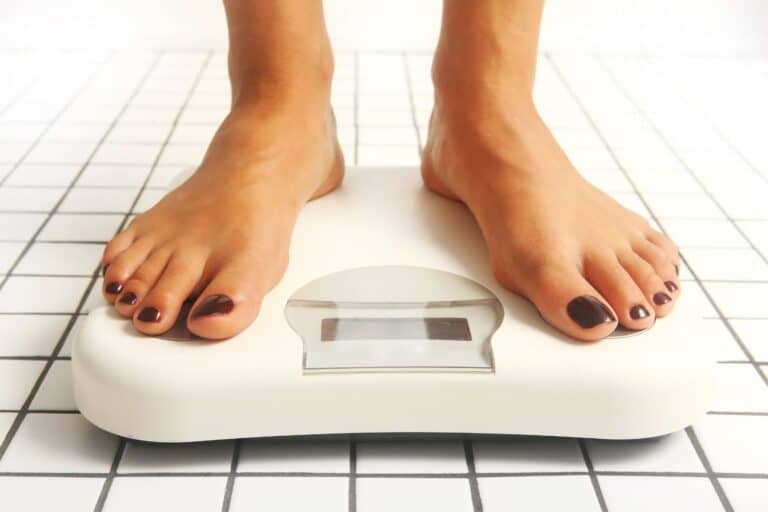What is leptin resistance?
Leptin resistance is a condition where the body cannot properly respond to the hormone leptin, which regulates appetite and metabolism. This condition can significantly impact weight management and make it difficult for people to lose or maintain a healthy weight.
Fat cells produce leptin, which acts as a signal to the brain, indicating that enough energy is stored in the body and that it should reduce appetite and increase metabolism. However, when someone becomes leptin resistant, their brain cannot adequately respond to this signal and may continue to feel hungry and have a slow metabolism, leading to weight gain.
Several factors can contribute to leptin resistance, including chronic inflammation, high levels of stress hormones such as cortisol, and a diet high in processed foods and sugar. In addition, sleep deprivation and lack of physical activity can also contribute to this condition.
Leptin resistance in perimenopause
During perimenopause, a woman’s levels of estrogen and progesterone begin to decline, which also affects the body’s ability to use insulin effectively. This can lead to insulin resistance, which can contribute to leptin resistance.
Women may also experience increased hunger and reduced metabolism. This can lead to overeating and weight gain, particularly around the midsection. Combine these with decreased muscle mass and increased body fat, and you have a perfect recipe for weight gain in perimenopause.
So, what can be done about leptin resistance?
The good news is you can take several steps to improve your body’s response to leptin and promote weight loss.
First off, let’s talk about diet.
You can’t out-exercise a bad diet, so put down the Doritos and pick up some leafy greens. A healthy, balanced diet can help reduce inflammation and support healthy hormone function.
Next up: MOVE.
Get regular exercise: Regular exercise can help reduce inflammation, improve insulin sensitivity, and promote healthy hormone function. Aim for at least 30 minutes of moderate-intensity exercise most days of the week.
Reduce stress.
Chronic stress can contribute to leptin resistance, so finding ways to reduce stress, such as meditation, yoga, or shortening your to-do list by 100 things, can be beneficial.
Go to bed.
Sleep deprivation screws everything up hormonally and generally wrecks your life. Sleeping can be next to impossible when hormones are out of balance, so if you’re struggling, read this.
Consider supplements.
Some supplements, such as omega-3 fatty acids, can help reduce inflammation and improve insulin sensitivity, improving leptin function. Here is my new favorite that I am trying myself: https://awakendnation.com/drannagarrett/product. It’s a combo of dietary fiber and fatty acids that counters leptin resistance.
Check a leptin level.
If you are overweight and/or constantly hungry, it may be worth checking a leptin level. No, insurance won’t cover it, and your doctor may not be willing to order it. However, You can order it yourself for $59. (see below)
In conclusion, leptin resistance can significantly impact weight management, but there are steps you can take to improve your body’s response to this important hormone. Eating a healthy diet, exercising regularly, reducing stress, getting enough sleep, and considering supplements can support healthy leptin function and promote weight loss.
What’s Happening?
Want to check your leptin level?
You can order it yourself right here: https://www.ultalabtests.com/partners/drannagarrett/test/leptin. You must be fasting for this test.
Need to address weight loss resistance?
This supplement, containing fatty acids and fiber, produces serious weight loss results! And it has a 60-day money-back guarantee. Check out more details here: https://awakendnation.com/drannagarrett/product
Hormonal changes in midlife can turn your previous workout habits into your nemesis.
But your midlife (and beyond) hormones are your ally if you allow them to be data that inform your exercise.
You have a unique set of hormones, metabolism, body composition, and socialization that demand a unique exercise prescription.
Learn why what used to work for you no longer works and what to do about it.
—>>Join me at the complimentary and online “What, When & Why to Exercise for Women 40+!”
Dr. Anna Garrett is a menopause expert and Doctor of Pharmacy. She helps women who are struggling with symptoms of perimenopause and menopause find natural hormone-balancing solutions so they can rock their mojo through midlife and beyond. Dr. Anna is the author of Perimenopause: The Savvy Sister’s Guide to Hormone Harmony. Order your copy at www.perimenopausebook.com.
Also, she offers a membership group, Hormone Harmony with Dr. Anna Garrett, which provides women in midlife with affordable expert guidance and community support.
Dr. Anna is available for 1-1 consultation. Find out more at www.drannagarrett.com/lets-




